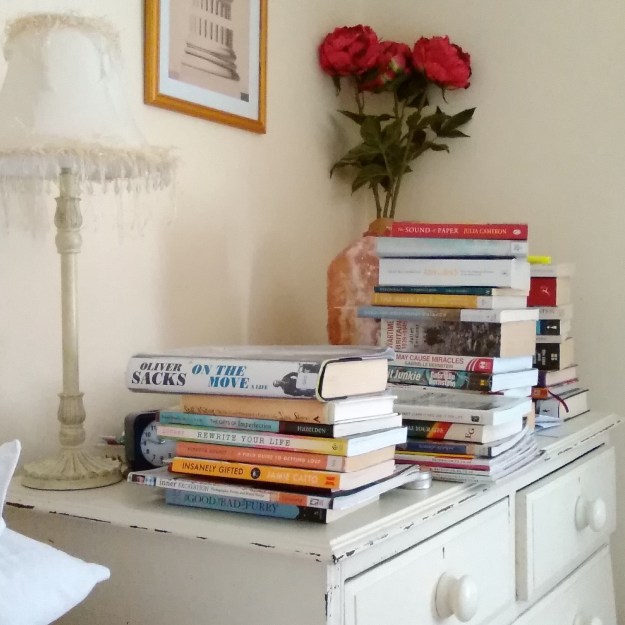
Focus.
In a world of multi-tasking, it something most of us have forgotten.
Stand in any street and you will see a mother pushing a pushchair, laden with shopping as well as her baby, perhaps another child or two trailing behind, with a mobile phone clamped to her ear. This woman is doing at least three tasks at once, and is probably not able to concentrate on any of them properly. The same is true of the man driving along the motorway, his mind on his business meeting to come, a bag of crisps in his lap to keep hunger at bay, talking to a colleague on his hands-free (I hope) phone. I’m not saying mobile technology is the evil of our times. What I am saying is that its so easy to get distracted that we rarely do one thing, and one thing alone.
You only have to look at my bedside table to see that I am the worst victim of this curse. A glance at the picture above will show you that I have 32 books currently on the go! (That’s not counting the magazines under the second pile in – there are actually four piles there. Its also not counting the ones on my desk in the study.) Another one arrived in the post this morning. And the heap includes 6 library books, which of course can go back to be exchanged for more goodies.
I know, I know.
I have a serious problem…
On a side note, it is interesting to me that, as someone who claims to be a fiction writer, there are very, very few novels on this heap. But more of that anon.
I really, really need to focus. Finally becoming overwhelmed by my book pile yesterday, I made the decision. This has to stop. I am going to focus on ONE BOOK and read it till it is finished. And then move on to the next. And read that till it is finished. And so on.
And I’m not allowed to buy any more books until this pile is finished.
Or go the library. (Which may actually be more difficult, because hey, free books!)
You may remember that I made the decision earlier in the year, as part of my commitment to my writing, to start reading a lot more, and I’m really doing well at that. The problem is that at the moment, most of what I am reading is non-fiction for research, fun and self-development, which isn’t going to feed my prose practice in the same way that quality novels would. I’ve got shelves of novels that I want to read, but never get around to. Research always seems more tempting. I wonder what this says about what I really need to be writing?
Anyway, I decided that today I will make a list of all the novels I have outstanding on the shelves all over the house. And then I will work my way through the list one at a time.
I’ve even been toying with the idea of having a total-immersion week, where I commit to doing nothing else but reading (other than my diary), in the hope that this will establish in me a voracious desire for fiction that only regular reading will sate.
The weird thing is that I never have this problem with fanfiction. I think its because its short. I spent nearly five years writing solely in the Sherlock fandom, and that was where I did pretty much all my fiction reading. It was a continuous obsession, which fuelled what I think is some of my best work. I need to get that focus back, so I can write original fiction to the same pitch.
I’ll keep you posted as to how I get on!
Happy Creating,
EF

















